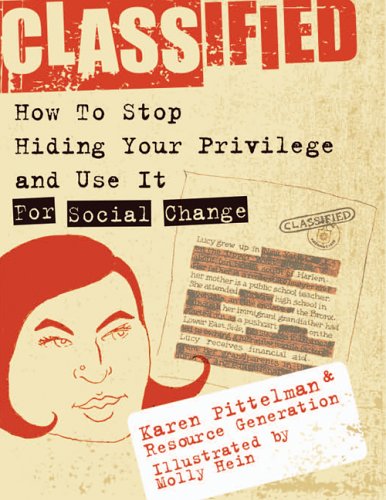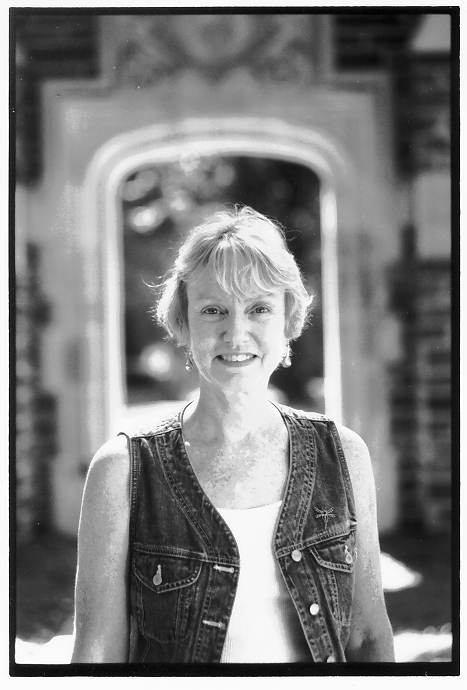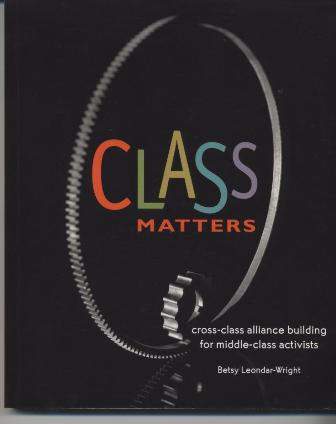Serendip is an independent site partnering with faculty at multiple colleges and universities around the world. Happy exploring!
Notes Towards Day 4 (Thurs, Sept. 8): Questions of Privilege
 |
 |
 |
in absentia: Happy 59th Birthday to Jody!!
I. Coursekeeping
do you know 3-4-more folks to the right and to the left of you?? 3???
note dates of your 6 writing conferences
by tomorrow @ 5: e-mail me your second paper--
imagine my filing system, and title the docs you send to me "Nancy1," "Jordan2," etc.--
3 pp. reflecting on the connections and distinctions you see between your
educational autobiography and others we've read (including those of your classmates)
remember to Write with Sources, and....
to do your "comparing and contrasting" to some end: develop an argument, build up a thesis:
what does it matter? so what? that you (and say, Luttrell) have similar-or-different stories to tell?
think of this (borrowing from some work by the physicist Karen Barad,
whom we're reading in my gender studies course) as "diffracting":
intersecting two patterns to make a new one
Barad's work is remarkable (and you should come hear her speak when she comes
to campus in November!); she incorporates quantum physics into gender studies
and social justice work. Her acknowledgements say, for instance, "I feel very fortunate
indeed to have been raised with working-class values, which refuse to measure the value
or worth of a person by their profession, accomplishments, education, wealth, or worldliness."
speaking of which!
by 8 p.m. Sunday night: in our on-line course forum, map your access to education.
You could do this verbally or visually, using an on-line spatial drawing software,
or in the form of a poster (if you choose this option, please take a photo and upload that on-line).
To do this: think about how you got here. Rather than telling a narrative,
think in terms of key marks (or stops?) along the way, rather than as a story.
What would the street be called, that got you from middle school to h.s.,
from h.s. to BMC? This is more "iconic" than narrative; it could be a poem.
Let yourself be released from (what Luttrell called) the "narrative
urgency"/"accounting"/"adding up" of last week's "storied self."
As before/always: there's no right way to do this; what's important
here is our exploring a range of different modes of representation.
By classtime on Tuesday (when both sections will
meet together, to share our access maps), also please read
Dorothy Allison. Two or Three Things I Know for Sure. 7-12
(mentioned by Luttrell as an exemplary "storied self"), and
“On the Uses of a Liberal Education.” Harper’s Magazine. September 1997:
Mark Edmundson, “As Lite Education for Bored College Students,” and
Earl Shorris, “As a Weapon in the Hands of the Restless Poor.” 39-59
(all in our password-protected file: /~adalke/esemf11/ )
Questions about logistics, etc??
Afterthoughts from Tuesday's class:
R-E-S-P-E-C-T
(cell phones, bathroom breaks, internet usage, yawning? what else??)
on-line conversation....
Little Italy: In my paper I said that class ... defines a culture. So ...is it right for people to try to change them?
Serena: I'm not sure if I agree with your position that the lower class has an associated culture, but rather think that those things which can widely observed throughout the class ... (for example, "high health risks") ... are caused by poverty and would be readily changed if possible... issues which are not voluntary but imposed....What could be considered a "culture," I feel, would be better described as statistics or stereotypes. There is no question whether the lower classes should be allowed better opportunities ...and a chance of social mobility.
... I opened my writing with a less formal anecdote, though .. I soon after fell into my old formalities .... I suppose my way of writing comes partially from a need to disguise myself behind formalities....
Jomaira: I could definitely relate to your experience ... trying to overcompensate ... with fancy words. I come from an immigrant working class family and coming to Bryn Mawr was a tremendous culture shock for me, because I found that I couldn't express myself, nor did I have the "cultural capital", in Bourdieu's definition of the word, that my peers brought to the classroom. This lead to a huge attempt on my part to change who I was, I ... constantly tried to learn things that would disguise the fact that I simply wasn't born in an environment that would allow me to be pretentious. I felt as though the fact that I couldn't express myself with fancy language meant that I wasn't as intelligent as others on campus.... I think that your ( and my) experience with such an issue is a result of our experiences not being valued in traditional education systems and our understanding that class and privilledge can be created (or masked) through language.
II. Today's reading: 3 chapters from Jane Tompkins' educational autobiography
(set, in part, @ BMC a few decades ago--so:what were your first impressions?
how does her experience compare w/ yours??)
Talking Notes --toward a "classified" reading of Tompkins
Tompkins came to speak here when her book came out,
to talk about her excellent education "in a purely academic sense,
had a retardant effect on her development as a whole being"
BECAUSE of that excellence, she said, she had very little
self-knowledge, and her relations w/ other people were not so good
she was an "exemplary product of our education system, not doing so well in living...."
educated away from listening to/knowing self, as own best authority
thesis: educational system ignores the knowing self,
teaches us not to trust our experience
knowledge essential to conduct of human life is w/out standing in the curriculum
(xiv) purpose of education: "give them skills
to handle the things that are coming up in their lives"
Confirmatory data, an a-mail this week from a former student,
just diagnosed with a serious disease and being urged to have major surgery:
Even though I just graduated from one of the best colleges in the country,
I feel ill-equipped to deal with this particular challenge.
why is this dimension of our lives left out of school?
per Tompkins, "school, by definition: others who know better than we do"
give up own judgment in favor of authority; this militates against develpment of the individual
let's do now what you will be doing for your paper:
put two texts into "conversation" w/ one another
break into two groups, one Luttrell, one Tompkins:
what do you want to say to the other author?
what do you want to ask her?
come back into the large group for this conversation
traces of class in Tompkins' text:
p. 69: "college was a place where I could exercise my curiosity...
without worrying about earning a living…I felt challenged but also felt safe."
p. 75: "desires [for romance, and companionship] were real, and my own" [wherefrom the "real"?]
p. 76: "ascendency over…base materiality"
p. 79: "the capital of knowledge and skill, the huge investment of energy, time and effort
p. 81: "too refined to have a position"
p. 82: class bound prejudices implied by the word "propaganda"
p. 207: cloister as a missed opportunity, how cut off from life the students were, how cut off from the world they were about to enter
p. 208: afraid if they don't get a high-status liberal arts degree, they'll end up in a low-level job
p. 213: "Isn't your discontent the result of too much privilege?"
p. 215: Professors...are the Chinese emperors of the institution--with students as the crown princes…I had occupied an isolated, privileged space, unaware of what kept the institution running day to day… the hierarchical structure, which places people who take care of students' emotional, physical, and spiritual lives lower on the ladder than people who deal only with their minds…depreciates those aspects of being human that are missing from the curriculum and from our pedagogy….
p. 219: "The world of education is like a island where people, cut off from the world, are prepared for life by exclusion from it." (Montessori)
pp. 219-220: a small liberal arts college for women located in an affluent suburb…did not ask me to cope with too many new things at once….Bryn Mawr's seclusion was probably right for me at the time….
p. 223: it would be more helpful to students if…universities conceived education less as training for a career than as the introduction to a life.
Re-reading Tompkins' memoir through the lens of
Classified: How to Stop Hiding Your Privilege and Use It
by "Resource Generation," an organization of young people with wealth, who believe that
there is an unjust distribution of resources and want to a part of working towards change;
and believe that they have valuable resources (money, access, connections) to bring to this work;
focus on privilege=getting an unfair advantage because you are part of a group;
understanding privilege=figuring out all the ways you're not unique
(vs. discrimination=getting an unfair disadvantage; deal w/ it by reclaiming individual identity)
looks also @ the "fancyhood": institutional privilege (preferential
admission for legacy students; tax credits for homeowners), or
"the more we have, the more we get";
"the level playing field" is severely slanted
the "village" that gets left out of most money stories of "self-made men"
see also Class Matters: Cross Class Alliance Building for Middle-Class Activists
different material realities and experiences socialize
most Americans into four distinct cultural classes:
low-income, working-class/lower middle-class,
professional middle-class and owning-class
similarities in expection of steady employment @ polar ends of class;
differences between "settled living" and "hard living" in the middle
"What does it do to the culture when everyone has money or
lacks money? It adds or removes a sense of efficacy and entitlement....
being poor means that things don't reliably work."
"low-income people are more likely to be unconventional dreamers,
but most don't have the time, energy or hope to launch their dreams
in any major, outward way....But it's also it's important not to assume
that hardship empties people's minds and hearts...."
"US-born working-class people are more likely to [be 'rooted'] ... Professional middle-
class people and owning-class people, on the other hand, tend be to "'unrooted'"....
Moving past barriers for Middle-Class Activists, from
1) pretense to authenticity
2) politeness and caution to openness and humor
3) competition and superiority to confident humility
4) excessive abstraction to groundedness
5) guilt to balanced responsibility
6) individual achievement anxiety to community interdependence
How to talk about Jane Tompkins' thesis, in these terms??


